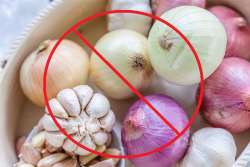Navratri 2017: What Foods can you eat while Fasting (Vrat) ? Why is it forbidden to eat Onion and Garlic during fast?
Know why onion and garlic are not eaten during Navratri fasting. Diet dos and don'ts during Navratri Vrat.

Navratri 2017 has started on Thursday and from this day to 29th September, many Hindu households will denounce using onion and garlic while preparing meals. During the entire course of Navratri, Hindus refrain from eating onions, garlic and non-vegetarian. But do you know the reason why it is forbidden to have onion and garlic during fast? We will tell you in detail.
In Hindu religion, food has been categorised into three parts, Raajasic food, Taamasic food and Saatvik food. Those who are seeking spiritual enlightenment are advised to stay away from Rajasic and Tamasic food as they evoke desires and increase mental lethargy.
Saatvik food is advised for spiritual benefits. All vegetarian food items (Except few) fall under this category. Onion and garlic, on the other hand, are tamasic in nature. They create intense sexual energy. Hence, its consumption is avoided during Navratri, as it is the time when you try to inculcate mental discipline in life.
Food You can eat during Navratri fast
Flours and Grains
Buckwheat flour (Kuttu Ka Atta)
Water chestnut flour (Singhade Ka Atta)
Amaranth flour (Rajgira Ka Atta)
Barnyard millet flour (Sama Ke Chawal Ka Atta)
Barnyard millet (Sama Ke Chawal)
Arrowroot flour
Spices and Herbs you can use during Navratri
Cumin
Black pepper
Rock salt
Green cardamom
Cloves
Black peppercorns
Nutmeg
Dried pomegranate seeds
Ginger
Green chilli
Lemons
Carom seeds
Dry mango powder
Red chilli powder
Coriander and mint leaves
Curry leaves
Vegetables during Navratri
Potatoes
Pumpkin
Sweet potato
Colocasia
Yam
Raw banana
Raw or semi-ripe papaya
Tomatoes
Apart from these, you can also eat fruits, lotus seeds, dry fruits, sabudana, dairy products, sugar, honey, jaggery, tamarind, coconut milk and oil, melon seeds, peanuts and groundnut oil.